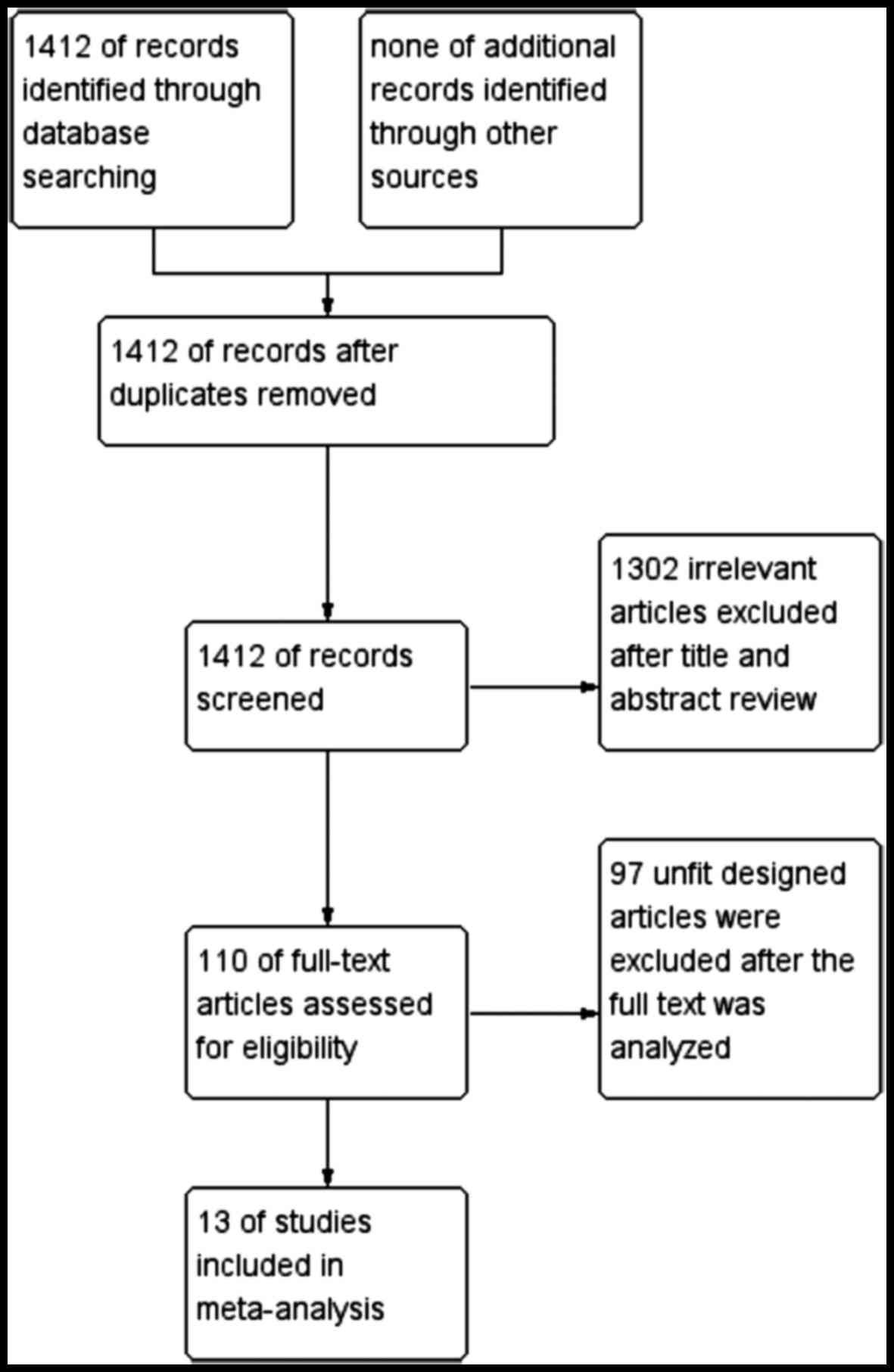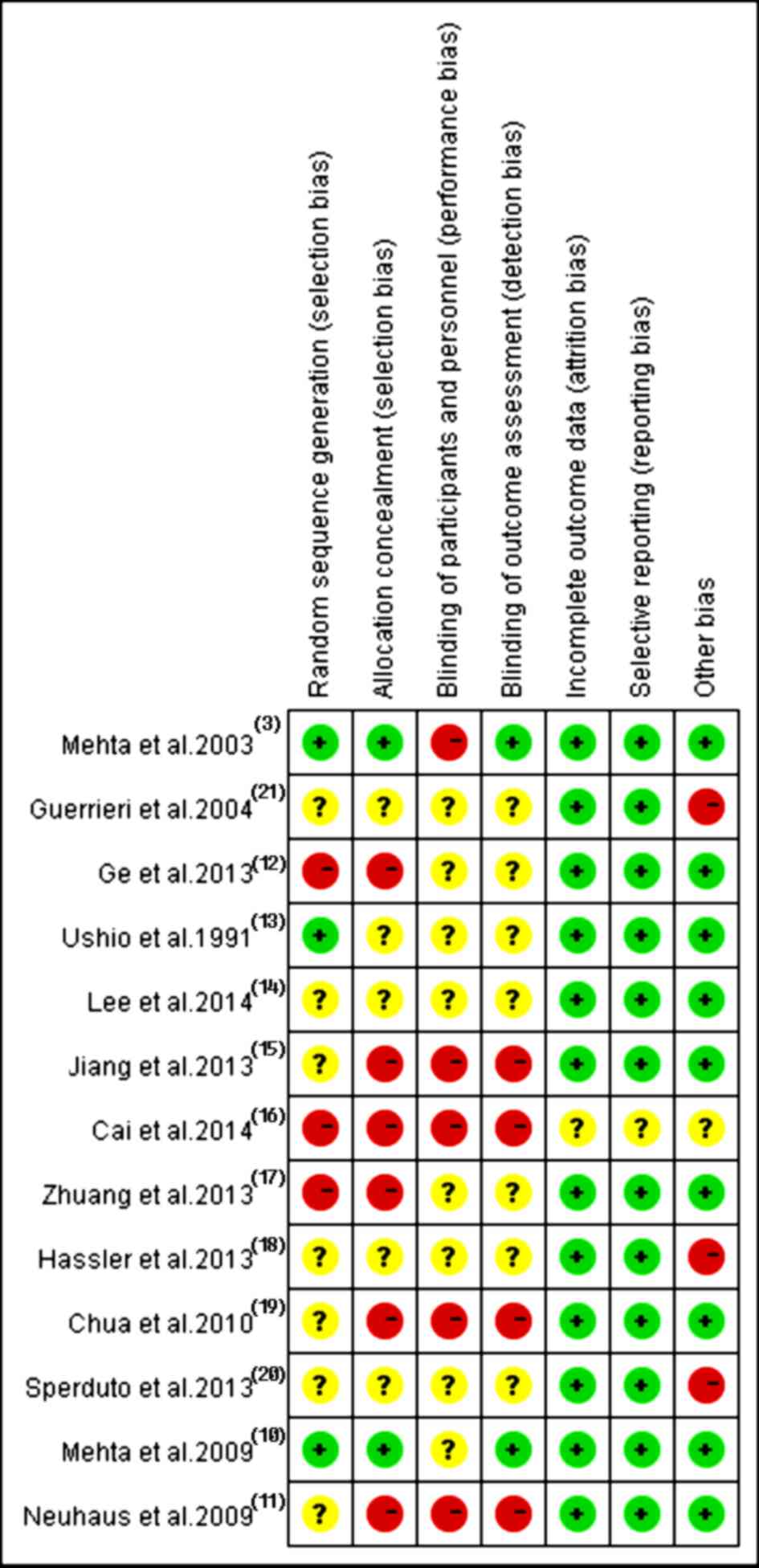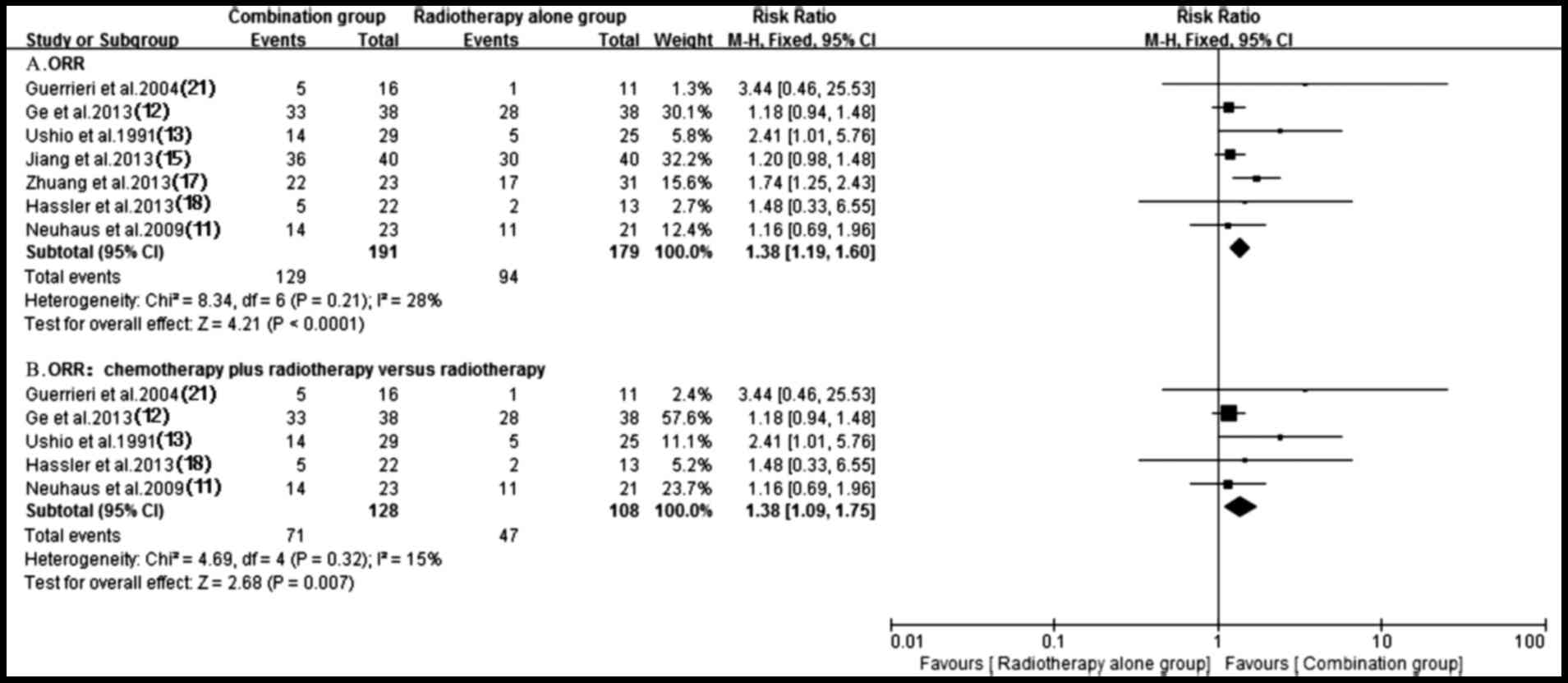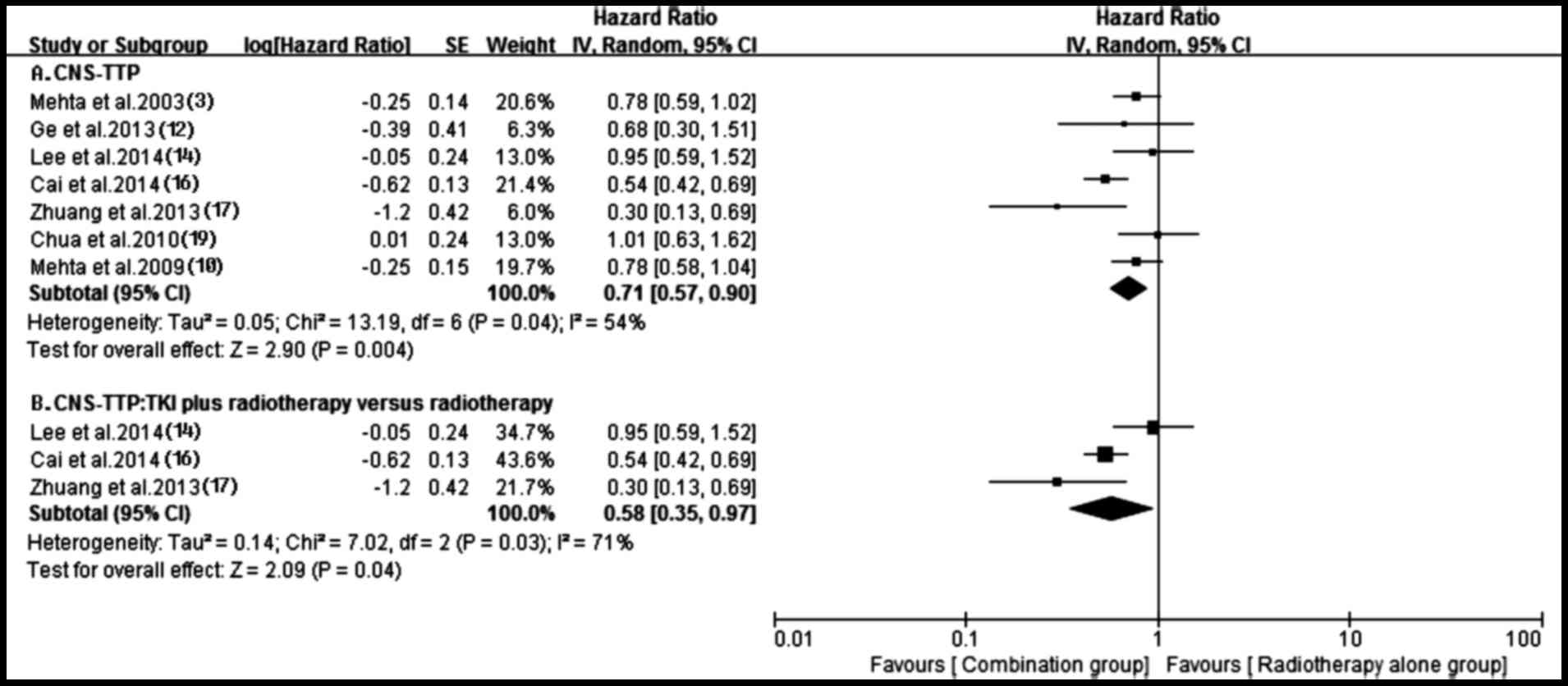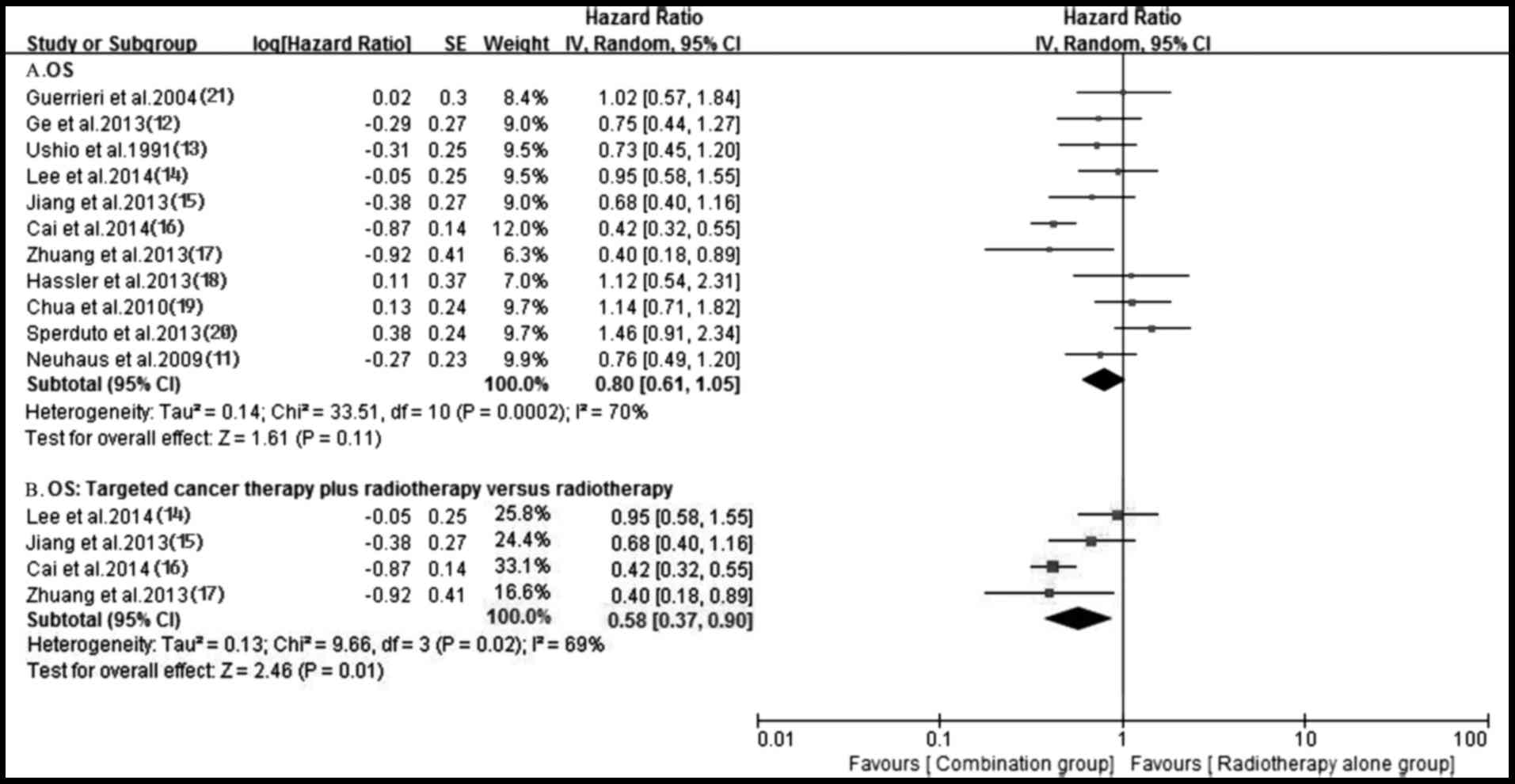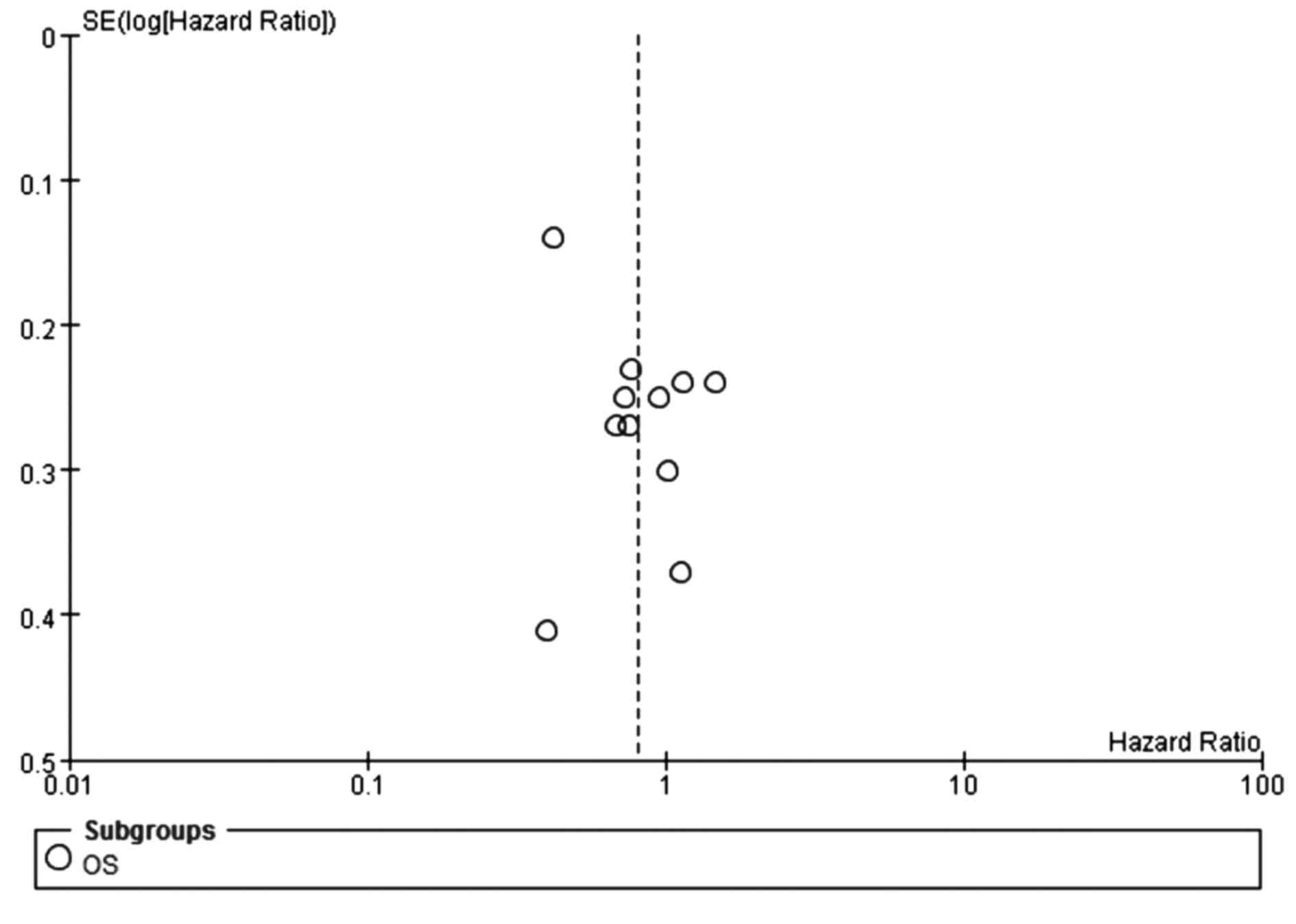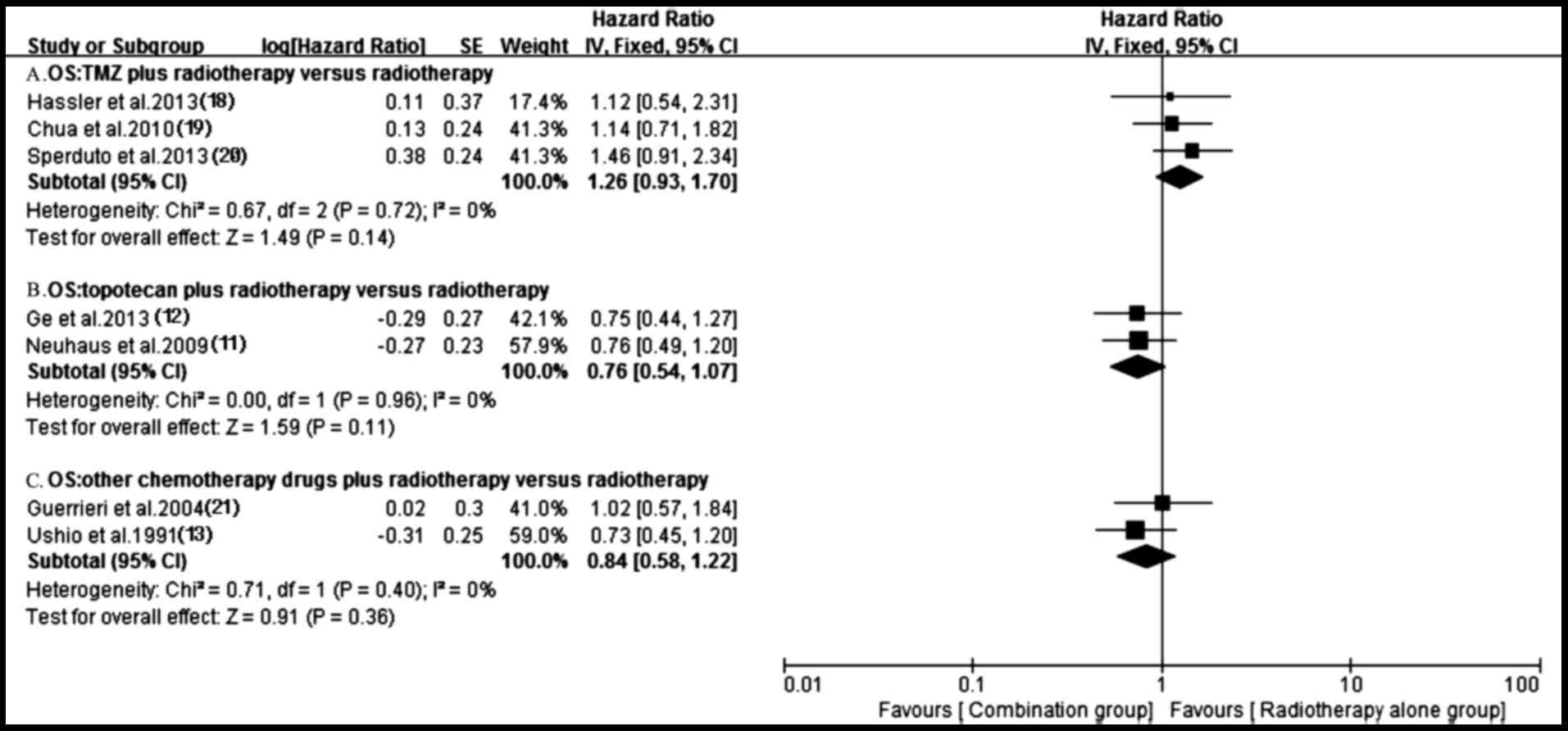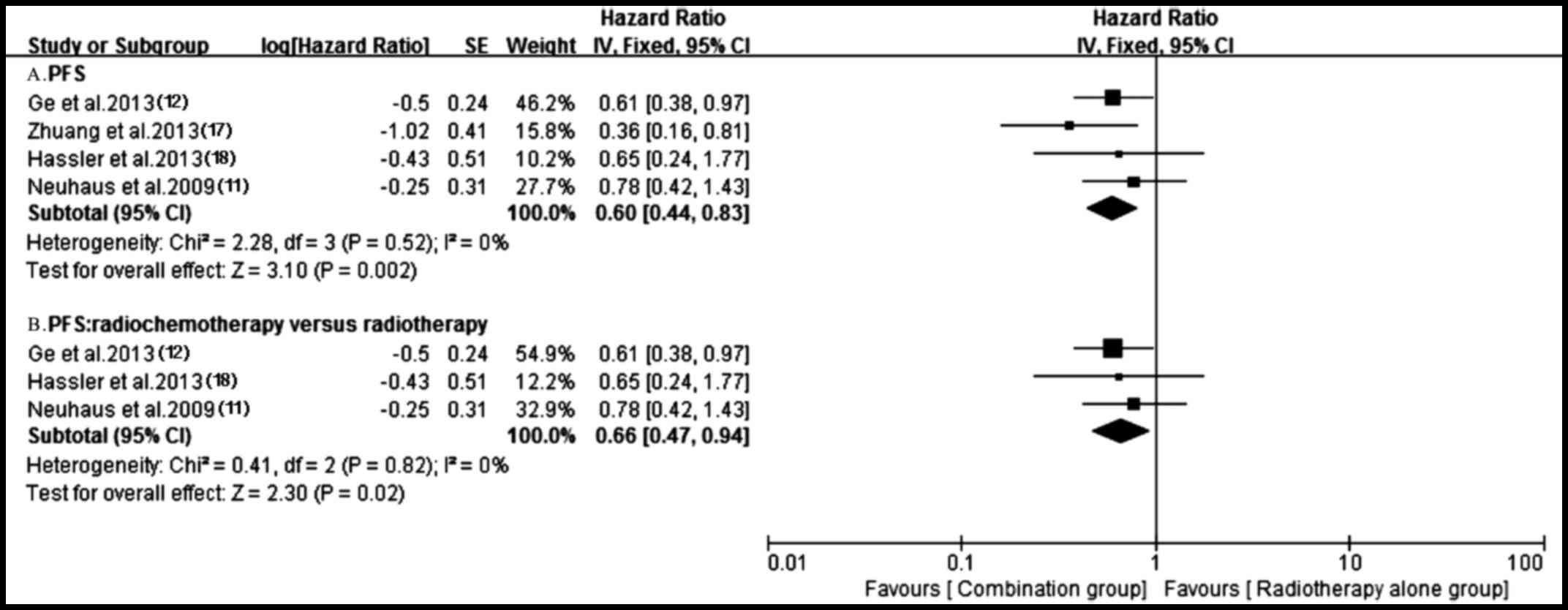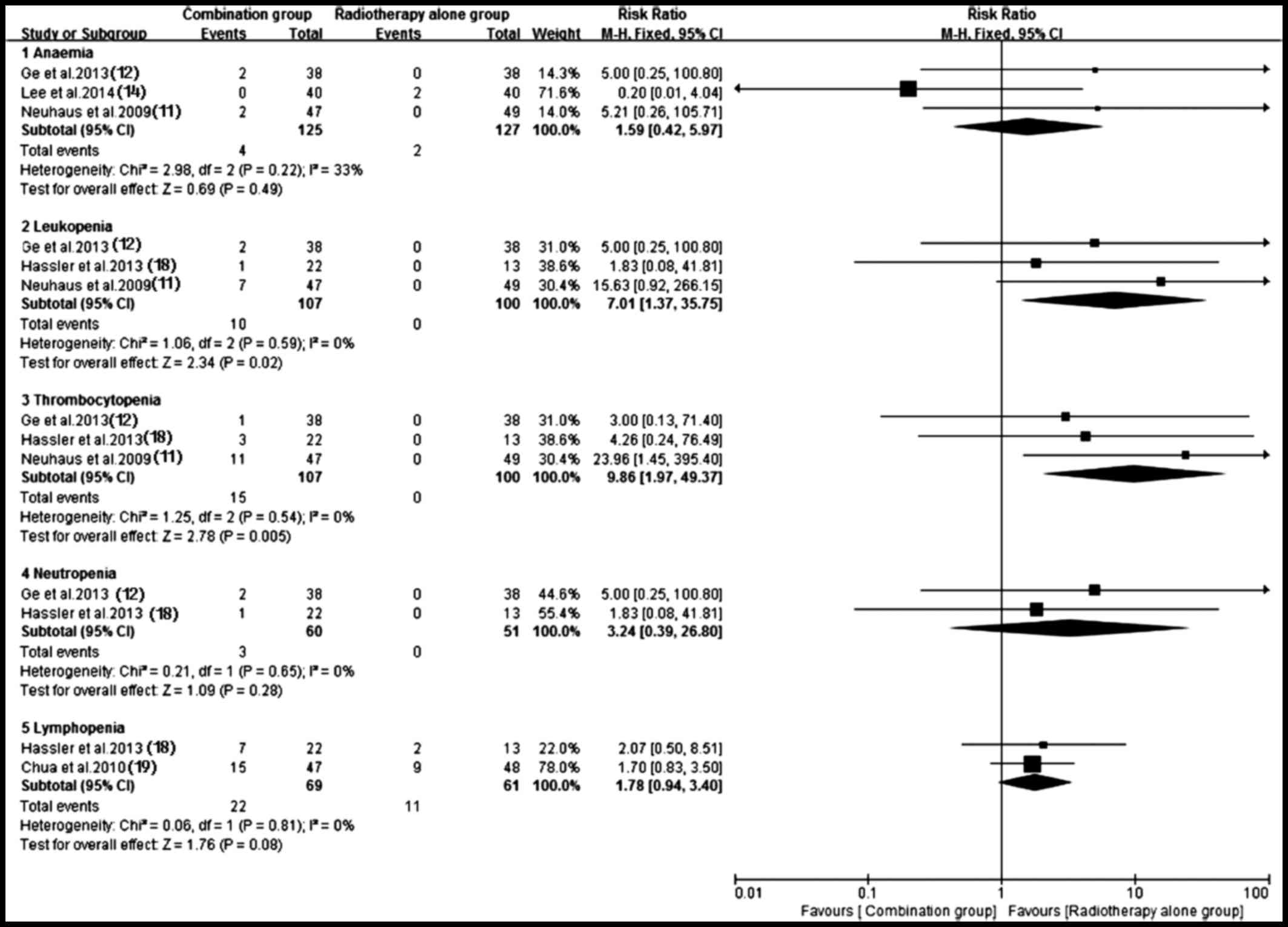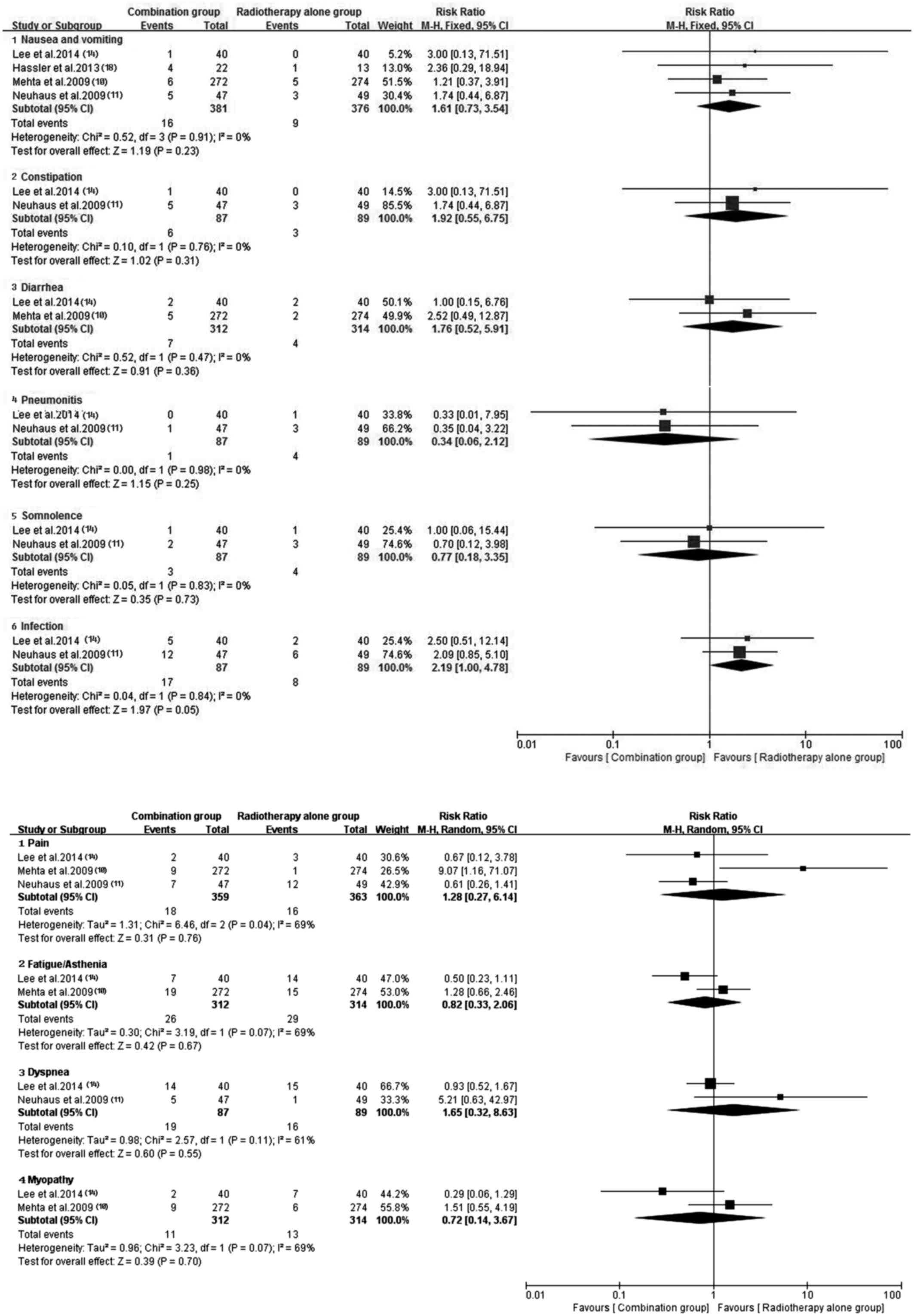|
1
|
Soffietti R, Rudà R and Trevisan E: Brain
metastases: Current management and new developments. Curr Opin
Oncol. 20:676–684. 2008. View Article : Google Scholar : PubMed/NCBI
|
|
2
|
Delattre JY, Krol G, Thaler HT and Posner
JB: Distribution of brain metastases. Arch Neurol. 45:741–744.
1988. View Article : Google Scholar : PubMed/NCBI
|
|
3
|
Mehta MP, Rodrigus P, Terhaard CH, Rao A,
Suh J, Roa W, Souhami L, Bezjak A, Leibenhaut M, Komaki R, et al:
Survival and neurologic outcomes in a randomized trial of motexafin
gadolinium and whole-brain radiation therapy in brain metastases. J
Clin Oncol. 21:2529–2536. 2003. View Article : Google Scholar : PubMed/NCBI
|
|
4
|
Sundstörm JT, Minn H, Lertola KK and
Nordman E: Prognosis of patients treated for intracranial
metastases with whole-brain irradiation. Ann Med. 30:296–299. 1998.
View Article : Google Scholar : PubMed/NCBI
|
|
5
|
Patchell RA, Tibbs PA, Walsh JW, Dempsey
RJ, Maruyama Y, Kryscio RJ, Markesbery WR, Macdonald JS and Young
B: A randomized trial of surgery in the treatment of single
metastases of the brain. N Engl J Med. 322:494–500. 1990.
View Article : Google Scholar : PubMed/NCBI
|
|
6
|
Cho KH, Hall WA, Gerbi BJ, Higgins PD,
Bohen M and Clark HB: Patient selection criteria for the treatment
of brain metastases with stereotactic radiosurgery. J Neurooncol.
40:73–86. 1998. View Article : Google Scholar : PubMed/NCBI
|
|
7
|
Morris PG, Correa DD, Yahalom J, Raizer
JJ, Schiff D, Grant B, Grimm S, Lai RK, Reiner AS, Panageas K, et
al: Rituximab, methotrexate, procarbazine, and vincristine followed
by consolidation reduced-dose whole-brain radiotherapy and
cytarabine in newly diagnosed primary CNS lymphoma: Final results
and long-term outcome. J Clin Oncol. 31:397l–3979. 2013. View Article : Google Scholar
|
|
8
|
Cortot AB, Gerinière L, Robinet G, Breton
JL, Corre R, Falchero L, Berard H, Gimenez C, Chavaillon JM, Perol
M, et al: Phase II trial of temozolomide and cisplatin followed by
whole brain radiotherapy in non-small-cell lung cancer patients
with brain metastases: A GLOT-GFPC study. Ann Oncol. 17:1412–1417.
2006. View Article : Google Scholar : PubMed/NCBI
|
|
9
|
Lukas RV, Nicholas MK, Villaflor V,
Hoffman PC and Salgia R: Temozolomide and/or erlotinib in the
treatment of lung cancer patients with progressive central nervous
system metastases. J Neurol Res. 2:1–9. 2012.PubMed/NCBI
|
|
10
|
Mehta MP, Shapiro WR, Phan SC, Gervais R,
Carrie C, Chabot P, Patchell RA, Glantz MJ, Recht L, Langer C, et
al: Motexafin gadolinium combined with prompt whole brain
radiotherapy prolongs time to neurologic progression in
non-small-cell lung cancer patients with brain metastases: Results
of a phase III trial. Int J Radiat Oncol Biol Phys. 73:1069–1076.
2009. View Article : Google Scholar : PubMed/NCBI
|
|
11
|
Neuhaus T, Ko Y, Muller RP, Grabenbauer
GG, Hedde JP, Schueller H, Kocher M, Stier S and Fietkau R: A phase
III trial of topotecan and whole brain radiation therapy for
patients with CNS-metastases due to lung cancer. Br J Cancer.
100:291–297. 2009. View Article : Google Scholar : PubMed/NCBI
|
|
12
|
Ge XH, Lin Q, Ren XC, Liu YE, Chen XJ,
Wang DY, Wang YQ, Cao B, Li ZG and Liu ML: Phase II clinical trial
of whole-brain irradiation plus three-dimensional conformal boost
with concurrent topotecan for brain metastases from lung cancer.
Radiat Oncol. 8:2382013. View Article : Google Scholar : PubMed/NCBI
|
|
13
|
Ushio Y, Arita N, Hayakawa T, Mogami H,
Hasegawa H, Bitoh S, Oku Y, Ikeda H, Kanai N and Kanoh M:
Chemotherapy of brain metastases from lung carcinoma: A controlled
randomized study. Neurosurgery. 28:201–205. 1991. View Article : Google Scholar : PubMed/NCBI
|
|
14
|
Lee SM, Lewanski CR, Counsell N,
Ottensmeier C, Bates A, Patel N, Wadsworth C, Ngai Y, Hackshaw A
and Faivre-Finn C: Randomized trial of erlotinib plus whole-brain
radiotherapy for NSCLC patients with multiple brain metastases. J
Natl Cancer Inst. 106:pii: dju151. 2014. View Article : Google Scholar
|
|
15
|
Jiang X, Ding M, Qiao Y, Liu Y and Liu L:
Recombinant human endostatin combined with radiotherapy in the
treatment of brain metastases of non-small cell lung cancer. Clin
Transl Oncol. 16:630–636. 2014. View Article : Google Scholar : PubMed/NCBI
|
|
16
|
Cai L, Zhu JF, Zhang XW, Lin SX, Su XD,
Lin P, Chen K and Zhang LJ: A comparative analysis of EGFR mutation
status in association with the efficacy of TKI in combination with
WBRT/SRS/surgery plus chemotherapy in brain metastasis from
non-small cell lung cancer. J Neurooncol. 120:423–430. 2014.
View Article : Google Scholar : PubMed/NCBI
|
|
17
|
Zhuang H, Yuan Z, Wang J, Zhao L, Pang Q
and Wang P: Phase II study of whole brain radiotherapy with or
without erlotinib in patients with multiple brain metastases from
lung adenocarcinoma. Drug Des Devel Ther. 7:1179–1186. 2013.
View Article : Google Scholar : PubMed/NCBI
|
|
18
|
Hassler MR, Pfeifer W, Knocke-Abulesz TH,
Geissler K, Altorjai G, Dieckmann K and Marosi C: Temozolomide
added to whole brain radiotherapy in patients with multiple brain
metastases of non-small-cell lung cancer: A multicentric Austrian
phase II study. Wien Klin Wochenschr. 125:481–486. 2013. View Article : Google Scholar : PubMed/NCBI
|
|
19
|
Chua D, Krzakowski M, Chouaid C, Pallotta
MG, Martinez JI, Gottfried M, Curran W and Throuvalas N:
Whole-brain radiation therapy plus concomitant temozolomide for the
treatment of brain metastases from non-small-cell lung cancer: A
randomized, open-label phase II study. Clin Lung Cancer.
11:176–181. 2010. View Article : Google Scholar : PubMed/NCBI
|
|
20
|
Sperduto PW, Wang M, Robins HI, Schell MC,
Werner-Wasik M, Komaki R, Souhami L, Buyyounouski MK, Khuntia D,
Demas W, et al: A phase 3 trial of whole brain radiation therapy
and stereotactic radiosurgery alone versus WBRT and SRS with
temozolomide or erlotinib for non-small cell lung cancer and 1 to 3
brain metastases: Radiation therapy oncology group 0320. Int J
Radiat Oncol Biol Phys. 85:1312–1318. 2013. View Article : Google Scholar : PubMed/NCBI
|
|
21
|
Guerrieri M, Wong K, Ryan G, Millward M,
Quong G and Ball DL: A randomized phase III study of palliative
radiation with concomitant carboplatin for brain metastases from
non-small cell carcinoma of the lung. Lung Cancer. 46:107–111.
2004. View Article : Google Scholar : PubMed/NCBI
|
|
22
|
Mantel N and Haenszel W: Statistical
aspects of the analysis of data from retrospective studies of
disease. J Natl Cancer Inst. 22:719–748. 1959.PubMed/NCBI
|
|
23
|
Tierney JF, Stewart LA, Ghersi D, Burdett
S and Sydes MR: Practical methods for incorporating summary
time-to-event data into meta-analysis. Trials. 8:162007. View Article : Google Scholar : PubMed/NCBI
|
|
24
|
Higgins JP, Thompson SG, Deeks JJ and
Altman DG: Measuring inconsistency in meta-analyses. BMJ.
327:557–560. 2003. View Article : Google Scholar : PubMed/NCBI
|
|
25
|
Ford AC, Forman D, Hunt RH, Yuan Y and
Moayyedi P: Helicobacter pylori eradication therapy to prevent
gastric cancer in healthy asymptomatic infected individuals:
Systematic review and meta-analysis of randomized controlled
trials. BMJ. 348:g31742014. View Article : Google Scholar : PubMed/NCBI
|
|
26
|
Van Vulpen M, Kal HB, Taphoorn MJ and El
Sharouni S: Changes in blood-brain barrier permeability induced by
radiotherapy: Implications for timing of chemotherapy? (Review).
Oncol Rep. 9:683–688. 2002.PubMed/NCBI
|
|
27
|
Middlemas DS, Stewart CF, Kirstein MN,
Poquette C, Friedman HS, Houghton PJ and Brent TP: Biochemical
correlates of temozolomide sensitivity in pediatric solid tumor
xenograft models. Clin Cancer Res. 6:998–1007. 2000.PubMed/NCBI
|
|
28
|
Raymond E, Izbicka E, Soda H, Gerson SL,
Dugan M and Von Hoff DD: Activity of temozolomide against human
tumor colony-forming units. Clin Cancer Res. 3:1769–1074.
1997.PubMed/NCBI
|
|
29
|
Srivenugopal KS, Shou J, Mullapudi SR,
Lang FF Jr, Rao JS and Ali-Osman F: Enforced expression of
wild-type p53 curtails the transcription of the
O(6)-methylguanine-DNA methyltransferase gene in human tumor cells
and enhances their sensitivity to alkylating agents. Clin Cancer
Res. 7:1398–4009. 2001.PubMed/NCBI
|
|
30
|
Kohno T, Shitara N, Takakura K and Fujita
H: Role of FT-207 in the treatment of metastatic brain tumors.
Cancer Chemother (Tokyo). 3:729–734. 1976.
|
|
31
|
Ushio Y, Posner JB and Shapiro WR:
Chemotherapy of experimental meningeal carcinomatosis. Cancer Res.
37:1232–1237. 1977.PubMed/NCBI
|
|
32
|
Sung C, Blaney SM, Cole DE, Balis FM and
Dedrick RL: A pharmacokinetic model of topotecan clearance from
plasma and cerebrospinal fluid. Cancer Res. 54:5118–5122.
1994.PubMed/NCBI
|
|
33
|
Baker SD, Heideman RL, Crom WR, Kuttesch
JF, Gajjar A and Stewart CF: Cerebrospinal fluid pharmacokinetics
and penetration of continuous infusion topotecan in children with
central nervous system tumors. Cancer Chemother Pharmacol.
37:195–202. 1996. View Article : Google Scholar : PubMed/NCBI
|
|
34
|
O'Connor MM and Mayberg MR: Effects of
radiation on cerebral vasculature: A review. Neurosurgery.
46:138–151. 2000. View Article : Google Scholar : PubMed/NCBI
|
|
35
|
Hutchinson F: Molecular biology of
mutagenesis of mammalian cells by ionizing radiation. Semin Cancer
Biol. 4:85–92. 1993.PubMed/NCBI
|
|
36
|
Harms-Ringdahl M, Nicotera P and Radford
IR: Radiation induced apoptosis. Mutat Res. 366:171–179. 1996.
View Article : Google Scholar : PubMed/NCBI
|
|
37
|
Groen H, Sleijfer S, Meijer C, Kampinga
HH, Konings AW, De Vries EG and Mulder NH: Carboplatin- and
cisplatin-induced potentiation of moderate-dose radiation
cytotoxicity in human lung cancer cell lines. Br J Cancer.
72:1406–1411. 1995. View Article : Google Scholar : PubMed/NCBI
|
|
38
|
Xu S, Zakian K, Thaler H, Matei C, Alfieri
A, Chen Y and Koutcher JA: Effects of motexafin gadolinium on tumor
metabolism and radiation sensitivity. Int J Radiat Oncol Biol Phys.
49:1381–1390. 2001. View Article : Google Scholar : PubMed/NCBI
|
|
39
|
Grimm SA: Treatment of brain metastases:
Chemotherapy. Curr Oncol Rep. 14:85–90. 2012. View Article : Google Scholar : PubMed/NCBI
|
|
40
|
Weber B, Winterdahl M, Memon A, Sorensen
BS, Keiding S, Sorensen L, Nexo E and Meldgaard P: Erlotinib
accumulation in brain metastases from non-small cell lung cancer:
Visualization by positron emission tomography in a patient
harbouring a mutation in the epidermal growth factor receptor. J
Thorac Oncol. 6:1287–1289. 2011. View Article : Google Scholar : PubMed/NCBI
|
|
41
|
McKillop D, Hutchison M, Partridge EA,
Bushby N, Cooper CM, Clarkson-Jones JA, Herron W and Swaisland HC:
Metabolic disposition of Gefitinib, an epidermal growth factor
receptor tyrosine kinase inhibitor, in rat, dog and man.
Xenobiotica. 34:917–934. 2004. View Article : Google Scholar : PubMed/NCBI
|
|
42
|
Chinnaiyan P, Huang S, Vallabhaneni G,
Armstrong E, Varambally S, Tomlins SA, Chinnaiyan AM and Harari PM:
Mechanisms of enhanced radiation response following epidermal
growth factor receptor signaling inhibition by erlotinib (Tarceva).
Cancer Res. 65:3328–3335. 2005.PubMed/NCBI
|
|
43
|
Chen X, Pan Y, Zhang S, Chen D, Yang S, Li
X and Ma S: Rechallenge with gefitinib following severe
drug-induced hepatotoxicity in a patient with advanced non-small
cell lung cancer: A case report and literature review. Oncol Lett.
7:878–880. 2014.PubMed/NCBI
|
|
44
|
Hirsh V: Managing treatment-related
adverse events associated with egfr tyrosine kinase inhibitors in
advanced non-small cell lung cancer. Curr Oncol. 18:126–138. 2011.
View Article : Google Scholar : PubMed/NCBI
|
|
45
|
Fukuoka M, Wu YL, Thongprasert S,
Sunpaweravong P, Leong SS, Sriuranpong V, Chao TY, Nakagawa K, Chu
DT, Saijo N, et al: Biomarker analyses and final overall survival
results from a phase III, randomized, open-label, first-line study
of gefitinib versus carboplatin/paclitaxel in clinically selected
patients with advanced non-small-cell lung cancer in Asia (IPASS).
J Clin Oncol. 29:2866–2874. 2011. View Article : Google Scholar : PubMed/NCBI
|















